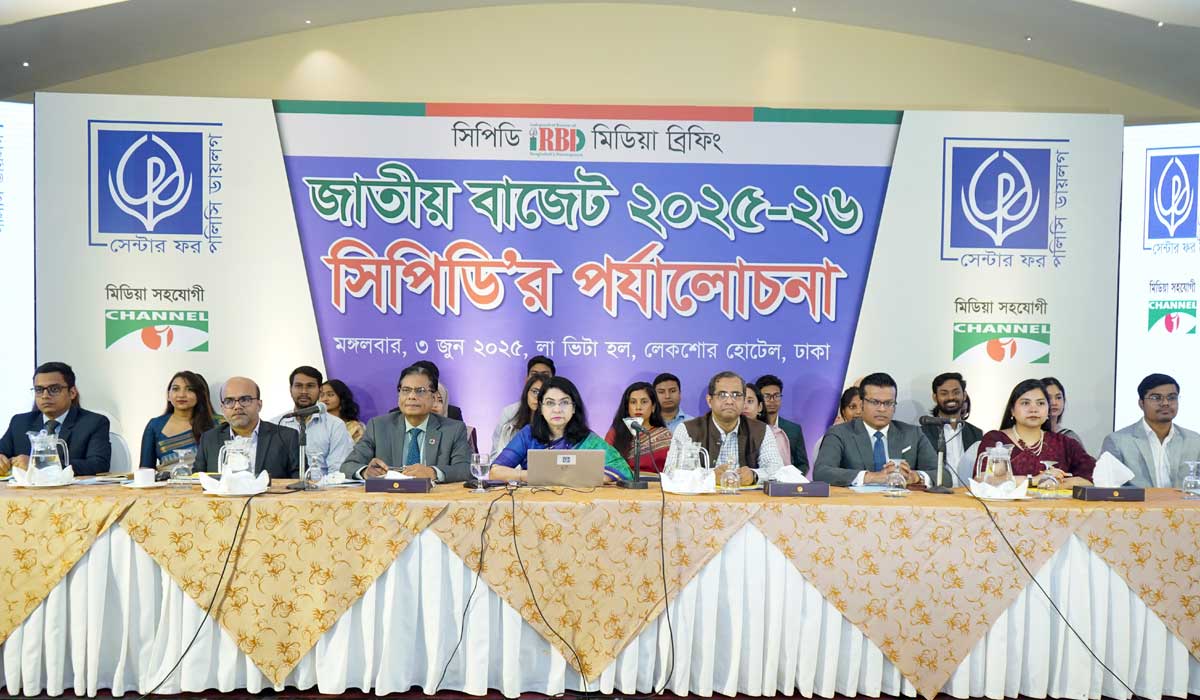
The proposed National Budget for FY2025-26 contains some positive elements but does not comprehensively address Bangladesh’s complex economic challenges. The macroeconomic targets are optimistic, with GDP growth projected at 5.5 per cent and inflation expected to fall sharply to 6.5 per cent. However, the achievability of these targets remains uncertain given the current economic and political climate.
In this context, the Centre for Policy Dialogue (CPD) organised a media briefing titled ‘CPD’s Analysis of the National Budget FY2025-26’ on Tuesday, 3 June 2025, following the budget presentation by the Hon’ble Finance Advisor of the interim government the day before.
Dr Fahmida Khatun, Executive Director of CPD, highlighted, ‘Revenue mobilisation is projected to grow faster than public expenditure; however, total public expenditure as a percentage of GDP is set lower than the previous fiscal year. The budget deficit is projected at 3.6 per cent of GDP, reduced from 4.1 per cent in the revised FY25 budget, with domestic financing expected to rise notably through net bank borrowing’.
The Annual Development Programme (ADP) allocation has been reduced by BDT 35,000 crore compared to the previous year, impacting 14 out of 15 sectors. Transportation and Communication, Power and Energy, and Local Government and Rural Development are among the hardest hit, alongside Education, Health, and Agriculture.
Dr Khatun observed, ‘Persistently low implementation rates and a high number of carryover projects continue to undermine development effectiveness. The newly added projects constitute only a small share of the ADP and a number of projects, including some megaprojects, are unlikely to meet their target of being completed within the fiscal year’.
Fiscal measures provide limited relief for low- and middle-income taxpayers, with only a marginal increase in the tax-free income threshold that may increase tax burdens. Corporate tax rates show a widening gap between listed and non-listed companies, which could affect tax compliance and equity.
She cautioned, ‘While the withdrawal of some tax exemptions is a positive step, increased tax rates on certain non-listed companies risk encouraging tax evasion. The introduction of mandatory digital tax submission is welcomed, though a more gradual implementation would have been preferable’.
Sectorally, education budget growth has slowed and remains below target GDP shares, with low development spending and inefficiencies in utilisation. Health sector allocations have decreased slightly, particularly in development expenditure, while agriculture faces declining shares and project execution challenges.
The Executive Director noted, ‘Allocations for employment and youth-related ministries have increased, but project execution remains sluggish and prioritisation inconsistent. SMEs receive increased budget shares, yet allocations are low relative to needs and past trends, with ongoing project delays’.
The power and energy sectors face reduced development budgets, with continued prioritisation of generation over transmission and distribution. Minimal funding for renewable energy projects fails to meet national commitments.
Professor Mustafizur Rahman, Distinguished Fellow; Dr Khondaker Golam Moazzem, Research Director; Mr Muntaseer Kamal; and Mr Syed Yusuf Saadat, Research Fellows at CPD, also participated in the event, sharing their insights and responding to the questions from the Media.



